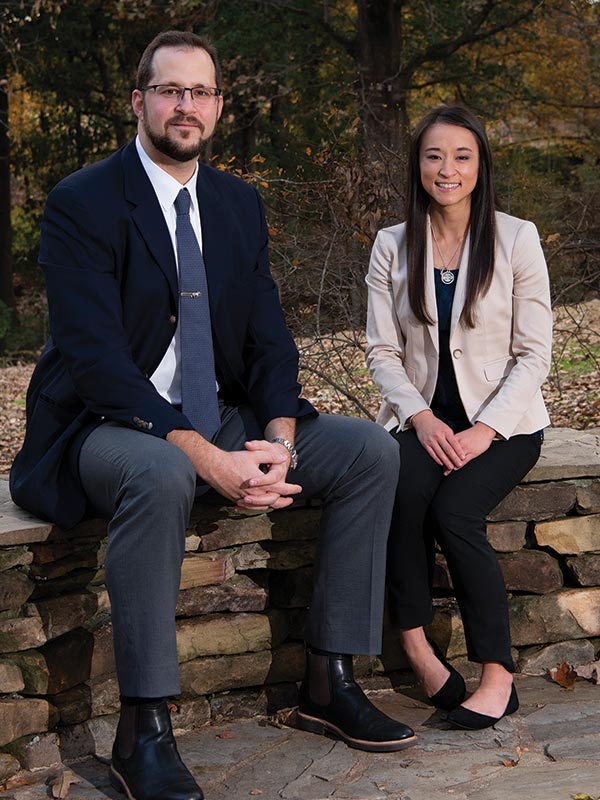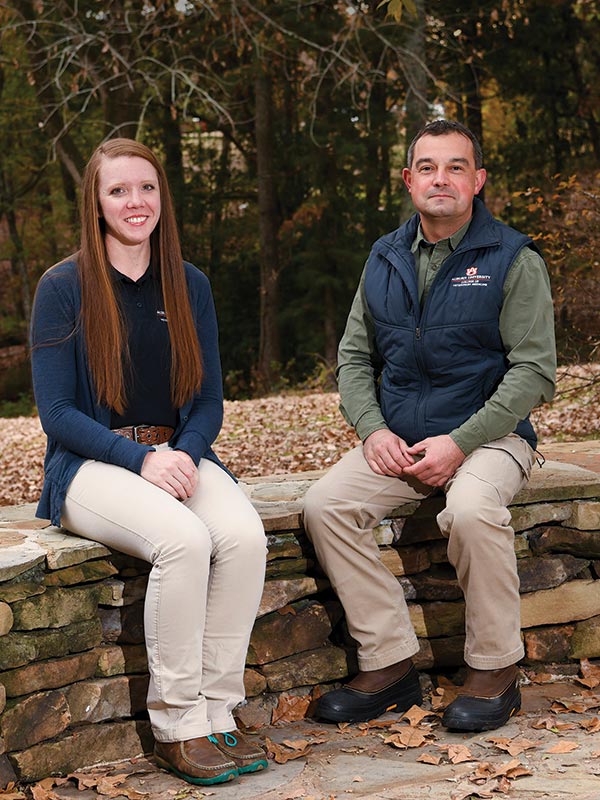Elite national training program leads veterinary medicine graduate researchers into biodefense workforce
Article body
Protection of the American public against infectious diseases and developing vaccines to counteract biological threats and cure the spread of contagious pathogens is not only a medical concern, but also one of national security significance. Biodefense is such a priority in the United States that the U.S. Department of Agriculture has multiple agencies involved in this mission.
At the top of the list is the construction, opening and staffing of the nation’s forthcoming National Bio- and Agro-Defense Facility (NBAF) and training of the scientists and veterinary medical officers who will operate it.
Perhaps nowhere is that training presence stronger than at the Auburn University College of Veterinary Medicine, where two of its graduate student researchers and their faculty mentors are participating in the NBAF Scientist Training Program (NSTP), sponsored by the USDA Animal and Plant Health Inspection Service (APHIS), and the related Veterinary Medical Officer (VMO) training program, sponsored by the USDA Agricultural Research Service (ARS). Both programs are designed to build the NBAF workforce.
Two graduate trainees and their Auburn faculty mentors are working with subject matter experts affiliated with APHIS, through the foreign animal disease and diagnostic laboratory, the ARS, and the National Institute of Allergy and Infectious Diseases (NIAID) Centers of Excellence for Influenza Research and Surveillance (CEIRS).
Virginia Aida, a third-year veterinary student, was awarded an NSTP fellowship in 2018. The Huntsville native came to Auburn after earning a bachelor's degree in biology with a minor in chemistry and a Master of Science in neuroscience from the University of Alabama at Birmingham. She has since been as an NSTP fellow in a dual D.V.M./Ph.D. degree program. Aida is mentored in research by Dr. Constantinos Kyriakis, an assistant professor in the Department of Pathobiology, whose Centers of Excellence for Influenza Research and Surveillance (CEIRS) NIH-funded research focuses on investigating immune responses and novel vaccine platforms against influenza A viruses in swine.
Dr. Shari Kennedy, a veterinary resident in large animal internal medicine who completed her DVM degree at Kansas State University, was supported by the ARS for her research by Dr. Thomas Passler, an associate professor in the Department of Clinical Sciences, whose research focuses on the infectious pathogen Bovine viral diarrhea virus (BVDV). Kennedy is pursuing the Ph.D. degree as she completes her residency.
Both Aida and Kennedy use the porcine model in their research.
“We use pigs in our research because they are a natural host of influenza and they have a very similar pathogenesis and immune response to infection with humans,” said Aida’s faculty mentor, Dr. Kyriakis.
As part of one of the CEIRS research projects, Kyriakis collaborates in a novel vaccine development study underway at the University of Georgia.
“We study the efficacy of a new generation vaccine that could offer protection against several strains of influenza,” Kyriakis said. “Unlike measles virus, which remains fairly stable and once we are vaccinated as kids we are protected for life, influenza viruses have multiple strains, which change significantly over time. This is why we need to frequently replace our vaccine strains and get the flu shot every single year. Vaccines that provide long-lasting and broad protection must be developed against ever-changing influenza virus. Here at Auburn, Virginia is testing these vaccines.”
Under the umbrella of the Animal Health Research Program at the College of Veterinary Medicine, Kennedy was already involved in research that the USDA was interested in before she was awarded support through the USDA-ARS VMO program.
BVD is a significant medical infection among livestock. It is highly contagious among various livestock species and is transmitted a number of ways. The USDA is interested in the development of vaccines that can control this pathogen.
“What we have learned is that some pigs infected either at birth or later with BVD are able to reproduce an immunity or cure,” Dr. Passler said. “We think this is due to a mutation of the virus that develops in the pig’s immune system. Shari is doing research to shed light on how this occurs.”
Aida and Kennedy are the first Auburn participants to be awarded USDA NSTP and ARS support as part of the NBAF workforce development effort. The opportunity was cultivated in part through the work of Dr. Frank “Skip” Bartol, associate dean of research and graduate studies in the College of Veterinary Medicine.
“The NSTP fellowship program was established to build the workforce of doctoral-level scientists required to support the NBAF mission, and the ARS-VMO program evolved to ensure that state-of-the-art clinical expertise would be available to support this mission” said Bartol “Having two of our students supported by these programs speaks very highly of the quality and caliber of our students, our faculty and our research programs here at the College of Veterinary Medicine.”
Upon completion of her five-year NSTP fellowship, Aida will begin her career as a scientist through a seven-year career appointment with the USDA APHIS in its foreign animal disease diagnostic laboratory at the new NBAF in Manhattan, Kansas.
While Kennedy’s participation through the USDA-ARS program does not contain the same service commitment, she says she also hopes to return to her home state and continue her career as a clinician-scientist at the NBAF facility there.
The mission of APHIS is to mitigate the influx and spread of foreign and serious plant and animal diseases into the United States. Its foreign animal disease diagnostic laboratory studies these diseases in highly bio-secure conditions. One of the primary goals is to test and validate vaccines to combat and treat those diseases in addition to serving as a national diagnostic laboratory.
The new NBAF is under construction on the Kansas State University campus in Manhattan, Kansas. The $1.25 billion facility includes a biosafety level-4 laboratory and will replace the aging Plum Island Animal Disease Center in New York. The NBAF is expected to be operational by 2022-2023.
Auburn University is a nationally ranked land grant institution recognized for its commitment to world-class scholarship, interdisciplinary research with an elite, top-tier Carnegie R1 classification and an undergraduate education experience second to none. Auburn is home to more than 30,000 students, and its faculty and research partners collaborate to develop and deliver meaningful scholarship, science and technology-based advancements that meet pressing regional, national and global needs. Auburn's commitment to active student engagement, professional success and public/private partnership drives a growing reputation for outreach and extension that delivers broad economic, health and societal impact. Auburn's mission to educate, discover and collaborate drives its expanding impact on the world.



